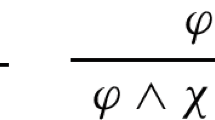Summary
Three uses of critical thought experiments outlined in the paper are related to general questions of evaluation. A proposal offered by Karl Popper concerning the so-called “apologetic” use ofGedankenexperimente is critically assessed. Specifically, his methodological principle that one should not use a second theory in order to defend a first theory against a critical thought experiment is discussed with reference to the photon-boxGedankenexperiment (Einstein-Bohr debates) and the Maxwell-demon paradox. It is argued that the rescuing of one theory from conceptual anomaly by appealing to another need not constitute a misuse of a critical thought experiment.
Similar content being viewed by others
Literature
Mach's earliest reference to the termGedankenexperiment is given in his essay “Über Gedankenexperimente”,Zeitschrift für den physikalischen und chemischen Unterricht, Vol. X (January, 1897), pp. 1–5. The article was rewritten by Mach and adapted to his later workErkenntnis und Irrtum, Leipzig: Johann Ambrosius Barth, 1905.
Thought experiments, according to Mach, are the necessary preconditions for physical experiments and as such they are guides to the performance of the real experiment. Pierre Duhem, inThe Aim and Structure of Physical Theory, carried Mach's analysis further by making some distinctions about the varieties of thought experiments. “The unperformed experiment, the experiment which would not be performed with precision, and the absolutely unperformable experiment do not exhaust the diverse forms assumed by the fictitious experiment in the writings of physicists who claim to be following the experimental method; there remains to be pointed out a form more illogical than all the others, namely, the absurd experiment.” According to Duhem, the absurd experiment is logically impossible to perform if construed as an empirical procedure. (Translated by P. Wiener. New York: Atheneum, 1962, p. 202.)
P. W. Bridgman,The Nature of Thermodynamics. Cambridge, Mass.: Harvard University Press, 1941, p. 156.
Sir James Jeans,The Dynamical Theory of Gases. Cambridge, Eng.: Cambridge University Press, 1925, p. 183.
“Über die Entropieverminderung in einem thermodynamischen System bei Eingriffen intelligenter Wesen”,Zeitschrift für Physik, Vol. 53, Nos. 11–12 (February–March, 1929), pp. 840–856.
The argument is a summary of the detailed analysis which appears in Leon Brillouin's workScience and Information Theory. New York: Academic Press, 1956.
Leon Brillouin, “Life, Thermodynamics, and Cybernetics”,American Scientist, Vol. 37, No. 4 (October, 1949), pp. 554–568.
Wolfgang Yourgrau emphasizes the importance of thought experiments in their early stages as pre-analytical arguments “before the proof has assumed its rational form of a concatenation of coherent steps.” (“On Models and Thought Experiments in Quantum Theory”,Monatsberichte der Deutschen Academie der Wissenschaften zu Berlin, Vol. 9, No. 11 (1967), p. 872.)
Bridgman,Op. Cit., p. 157.
In response to the Einstein-Podolsky-Rosen thought experiment, constructed to exhibit the incompleteness of quantum theory, D. H. Sharp leveled this kind of argument. (“The Einstein-Podolsky-Rosen Paradox Re-examined”,Philosophy of Science, Vol. 28, No. 3 (July, 1961), pp. 225–237.) The assumption by Einstein et al of the separability of the wave function was attacked by Sharp because of the impossibility of the attainment of zero interaction potential of two initially interacting and later spatially separated systems. Why is the idealization of zero interaction potential any different methodologically from that of an isolated or closed system which physicists are quite at home with? For a rejoinder to Sharp see C. A. Hooker, “Sharp and the Refutation of the Einstein, Podolsky, Rosen Paradox”,Philosophy of Science, Vol. 38, No. 2 (June, 1971), pp. 224–233.
Author information
Authors and Affiliations
Rights and permissions
About this article
Cite this article
Krimsky, S. The use and misuse of critical Gedankenexperimente. Zeitschrift für Allgemeine Wissenschaftstheorie 4, 323–334 (1973). https://doi.org/10.1007/BF01800847
Issue Date:
DOI: https://doi.org/10.1007/BF01800847



